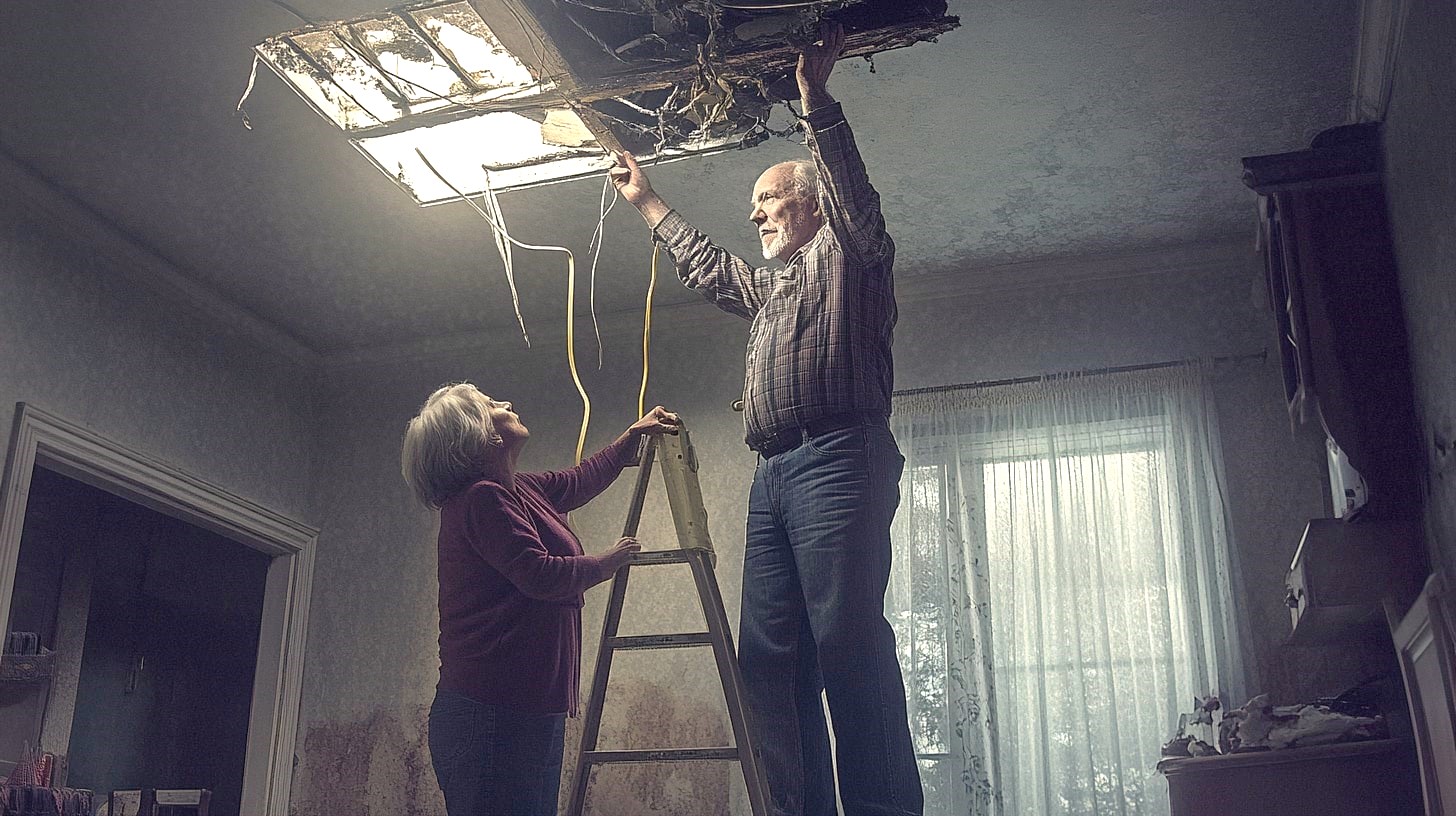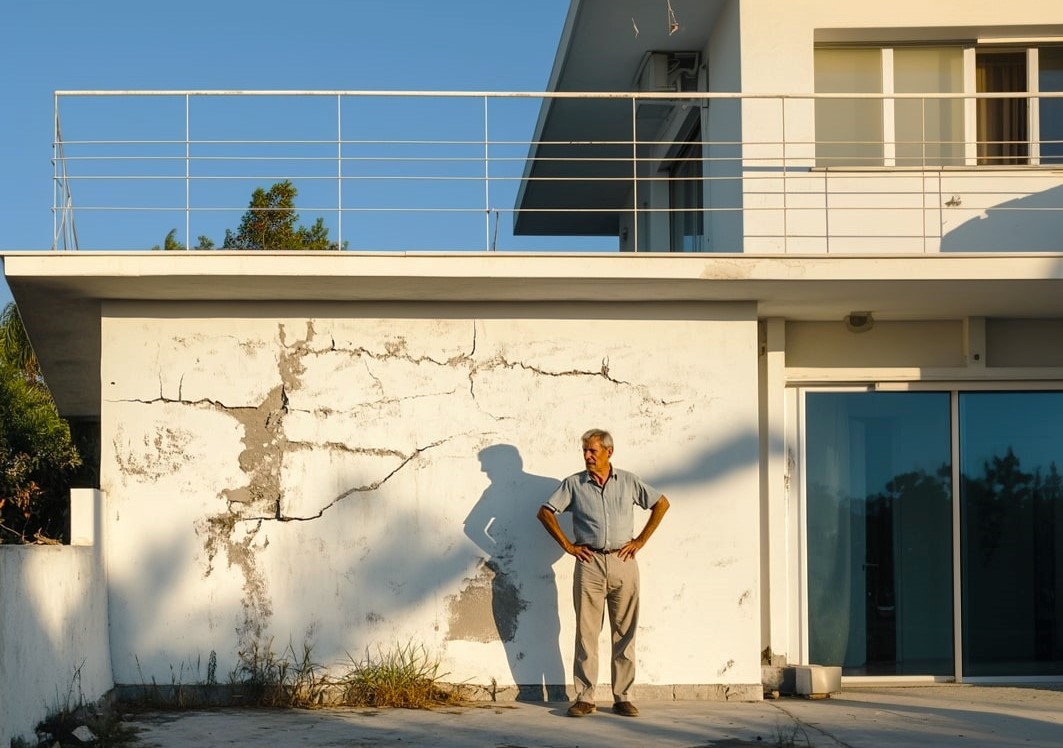‘Your landlord knows you can’t afford to move. So he just lets your home fall apart’
No heat, no light, no water. That was my Christmas.
Okay. I wasn’t stuck in a freezing Ukrainian subway, and I could both find and afford food. I’m well aware that I’m privileged to have a (albeit leaky) roof over my head.
But it was a shock – quite literally, in fact – when, on December 23, the entire electrical system of my rented home crashed into darkness…
Various experts were called. Electricians replaced light bulbs that instantly blew; switched fuses that sparked and popped like grilling souvla. Plumbers recoiled at the state of the piping and the water pump. Cablenet was staggered by the damage to their boxes and wiring.
At one point, I was told I was living in a death trap: a house that had not been maintained in many a long year – despite my repeated requests to the owner!
Five days of replacing parts and total rewiring later, it was all in semi-working order once more. But the lack of maintenance had set off alarm bells…
I began to wonder whether this issue might be island-wide. Was it just me? Or are poor maintenance standards plaguing the whole island?
Well, yes. It turns out they are.
According to the latest Eurostat report on housing, the island has the highest rate of leaking roofs, rot in window frames or flooring, and damp walls, floors or foundations in the EU. Almost a third of Cyprus is living with widespread housing neglect. And where there’s unresolved damage, there’s risk: damp seeping into electrical systems, rot undermining structural integrity, and poor maintenance turning homes into hazards.
But wait! There’s more…
In December last year, Interior Minister Constantinos Ioannou stated that hundreds of housing blocks are dangerously unmaintained, or are partially or poorly maintained to the point where they pose a hazard to residents and are a risk to public safety. It’s an issue, he says, “that is estimated to affect approximately half the population of Cyprus”!
Half! That’s 50 per cent of us who may be living in unsafe housing. Just the electrics alone are a major concern – and have already proven fatal.
In the space of just one month last summer, a 64-year-old man in Paphos was electrocuted while repairing a pool pump; a 76-year-old British resident of Ayia Thekla died while trying to remove a fuse; and a 22-month-old baby from Ypsonas passed away after suspected electrocution.
Meanwhile, the Civil Engineers’ Association of Cyprus has cautioned that ageing, poorly maintained buildings and unlicensed extensions are leading to structural failures such as balcony collapses, and urge lawmakers to introduce regular building inspections.

The fire service has expressed huge concern that “after the final approval for any building, from that time it is not checked at all for fire safety issues. No legislation provides for a fire safety check or who will carry it out.”
And the Cyprus Mail’s resident property expert Antonis Loizou warns that “once a home or building has been built, no particular attention is paid to maintaining it by most owners. Insurance, property taxes and wear and tear are the landlord’s responsibility,” he explains.
“Ha!” exclaims John Savvides. “Landlords don’t care as long as they get rent – they know they can find another tenant in a flash!”
In summer 2019, John rented a flat in Larnaca. By winter, the plaster was falling off the walls and huge cracks had developed. “I began to think I’d wake up one to find my whole bedroom had fallen off the side of the building!”
Repeated requests to the landlady had no effect. “She just didn’t care,” says John. “She honestly said to me ‘if you go, someone will pay more than you. I do not have to do anything.’ So I left.”
In Paphos (where buildings are often plagued by ‘accidents’), Sara Kingswell had a different issue.
“I’m not young anymore,” says the 69-year-old. “Shortly after I moved to a flat on the third floor, the elevator broke down. The landlord promised to send someone, but no one ever came. After three months of struggling up and down each day I had no choice but to leave.”
Tenants, it seems, are voting with their feet – leaving places that are not adequately maintained.
“But not all of us have that luxury,” says 42-year-old Limassolian Stelios Zacharides. “If you live in an older building, the rent is cheaper. Your landlord knows you can’t afford to move. So he just lets your home fall apart…”
Granted, Cyprus faces a unique set of challenges. Humidity, salty air and long, dry summers accelerate corrosion, rot and damp. The island lies in an earthquake-prone zone: buildings with foundational cracks, weakened walls or outdated designs are far more vulnerable to collapse. Construction materials must be imported – making both routine maintenance and essential repairs financially challenging for many property owners.
And then there’s the legacy of 1974.
The division of the island resulted in thousands of abandoned properties, disrupted urban planning and resource reallocation. Many buildings, hastily constructed to house displaced populations, have had little to no upkeep in decades.
It’s not all bad, of course. Many of us renters have had (or know) landlords who happily go above and beyond for their tenants. And there is some hope on the horizon: fast-track building permits aim to streamline compliance; local government reforms promise better oversight of dangerous buildings; and sustainable construction initiatives aligned with EU directives are pushing for safer, energy-efficient homes.
But does that really address the heart of the issue? Poor maintenance isn’t just about laws and permits – it’s a mindset. The real challenge lies in changing attitudes, fostering accountability, and creating a shared understanding that proper upkeep isn’t a luxury, it’s a necessity.
Where that leaves us, I’m not quite sure. Perhaps, right back where I started: sitting in the dark, wondering if next Christmas things will be a bit brighter, a bit safer. Not just for me, but for the whole island.






Click here to change your cookie preferences